Recipe for homemade chicken bone broth

Indeed, homemade chicken bone broth is renowned for its rich nutrient content, including collagen, gelatin, and glycine, which offer various health benefits such as joint support and amino acid supplementation.
While store-bought chicken bone broth may offer convenience, it might not provide the same nutritional advantages as homemade versions. Many commercial broths lack the extended cooking time needed to extract maximum nutrients, often containing additives and preservatives that compromise their healthfulness.
For those seeking to harness the full potential of chicken bone broth, crafting your own at home is recommended. With a simple recipe and some patience, you can create a nourishing broth that supports digestive health and overall wellness.
What is the difference between bone broth and broth
Chicken bone broth and chicken stock are two different preparations, each with its own unique characteristics. While they are both derived from boiling animal bones, the main difference lies in the cooking time and ingredients used.
Broth is typically made by simmering meat, vegetables, and herbs in water for a relatively short period, usually around 45 minutes to two hours. It tends to have a lighter flavor and is used as a base for soups, stews, and sauces.
On the other hand, stock is made by simmering bones (often with some meat still attached), along with vegetables and herbs, for a longer period, typically four to six hours or more. This extended cooking time allows for the extraction of more nutrients and flavors from the bones, resulting in a richer, more gelatinous liquid.
Bone broth is essentially an extended version of stock, simmered for even longer periods, often 24 hours or more. This prolonged cooking time allows for the breakdown of collagen and other connective tissues in the bones, resulting in a thicker, more nutrient-dense broth.
In summary, while broth is made with meat and cooked for a shorter time, stock and bone broth both involve simmering bones for longer periods, with bone broth being the most concentrated and nutrient-rich of the three.
Which Is Better: Chicken Bone Broth or Beef Bone Broth
Exactly, the choice between beef bone broth and chicken bone broth often comes down to personal preference. Chicken bone broth is known for its lighter flavor profile, while beef bone broth offers a richer, heartier taste. Ultimately, it's about selecting the option that best suits your taste preferences and dietary needs.
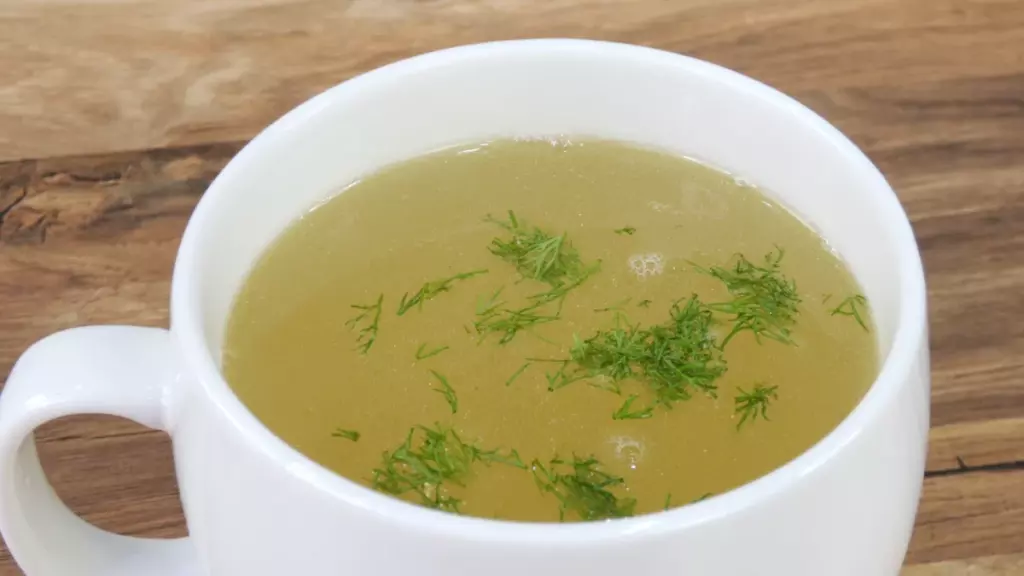
Both beef and chicken bone broth offer similar health benefits. They are easy to digest, gentle on the digestive system, and are often consumed to support skin and joint health. Both types of broth can also be used in bone broth fasting regimens.
When preparing beef bone broth, it's beneficial to cook it for a longer duration, given the thickness of beef bones compared to chicken bones. While some may opt for quicker methods like instant pot recipes, it's generally recommended to slow-cook bone broth at a lower temperature for an extended period to extract maximum nutrients and flavor.
Recipe Nutrition Facts
The exact nutrition content of this chicken bone broth recipe will vary depending on a number of factors, including the exact ingredients used, the length of cooking time and how much fat is skimmed off the top. In general, chicken bone broth nutrition is low in calories, fat and carbs, which makes sense because the chicken parts and vegetables are all removed at the end. It also make it a perfect keto drink.
In terms of sodium, you have control over how much salt you add to the broth. However, for this recipe, I recommend about a teaspoon of high-quality pink Himalayan sea salt.
There are several variations of making chicken broth, including instant pot chicken bone broth, chicken feet bone broth, or a whole chicken bone broth recipe. As indicated in this recipe, you can use various chicken parts or an entire chicken. Regardless of the method or ingredients used, I recommend maintaining the suggested cooking time for optimal flavor and nutrient extraction.
How to Make Chicken Bone Broth
Creating chicken stock from bones is quite simple! This recipe involves placing all the ingredients in a slow cooker or stock pot and allowing them to cook for several hours. Making chicken broth from bones is indeed straightforward.
Opting for organic ingredients can transform this into an organic chicken bone broth. It's advisable to choose organic free-range chicken to avoid exposure to hormones and antibiotics.
The resulting product can be enjoyed as a tasty chicken bone broth soup, or it can be incorporated into various recipes such as soups, stews, meats, vegetables, and more!

Begin by gathering and preparing all the required ingredients.
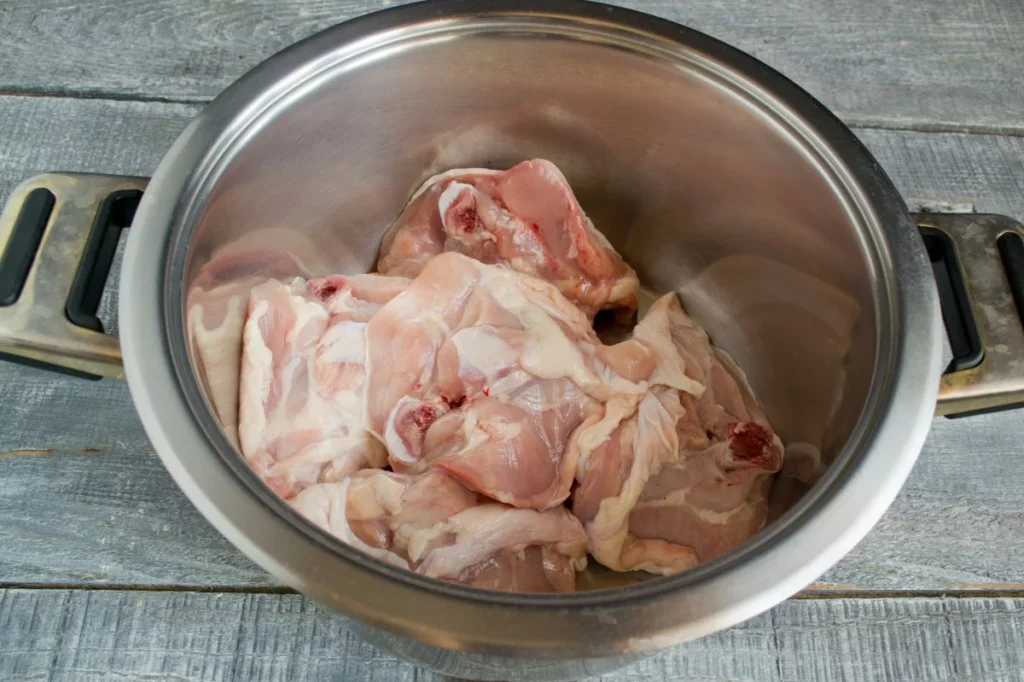
Next, place all the ingredients into a 10-quart capacity slow cooker. Begin by adding the chicken, followed by the veggies and water. If you're using a stovetop method, simply put all the ingredients into a large stock pot and bring them to a boil over high heat. Once boiling, reduce the heat and let it simmer gently.
Let the mixture simmer for 24–48 hours, remembering to skim off any fat occasionally. This extended cooking time at a low temperature enhances the benefits of chicken bone broth, allowing the ingredients to release their goodness into the broth.
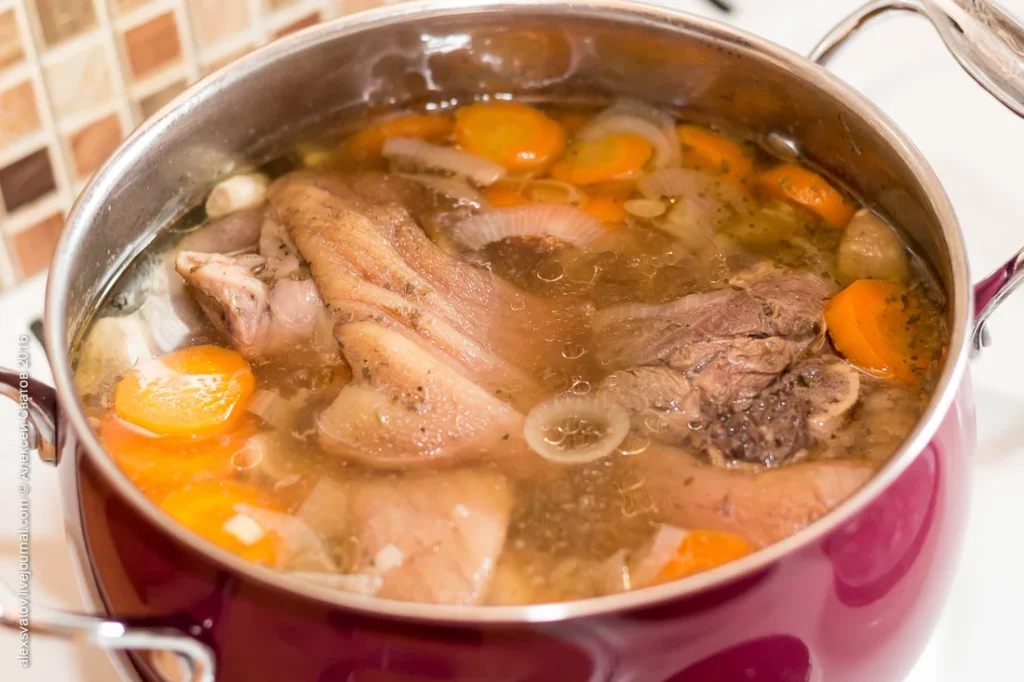
Remove the slow cooker or stock pot from the heat and allow the mixture to cool slightly. Once cooled, carefully discard any solids from the broth.
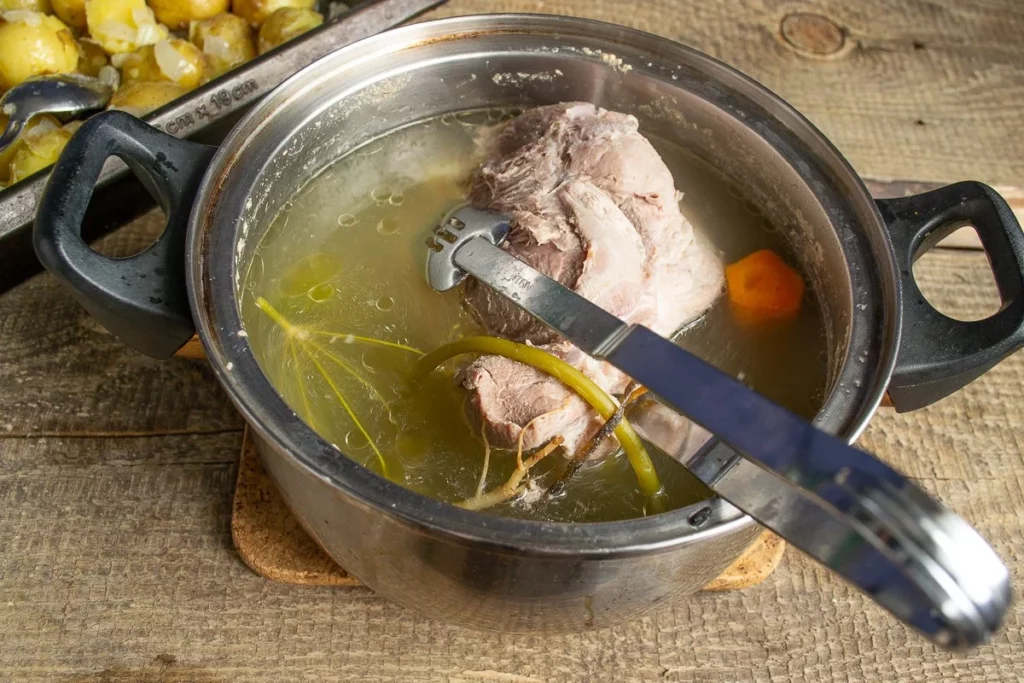
Strain the remaining liquid in the slow cooker or stock pot through a colander placed over a bowl. Discard any small bits or debris that remain in the colander, ensuring that only the clear broth is collected in the bowl.
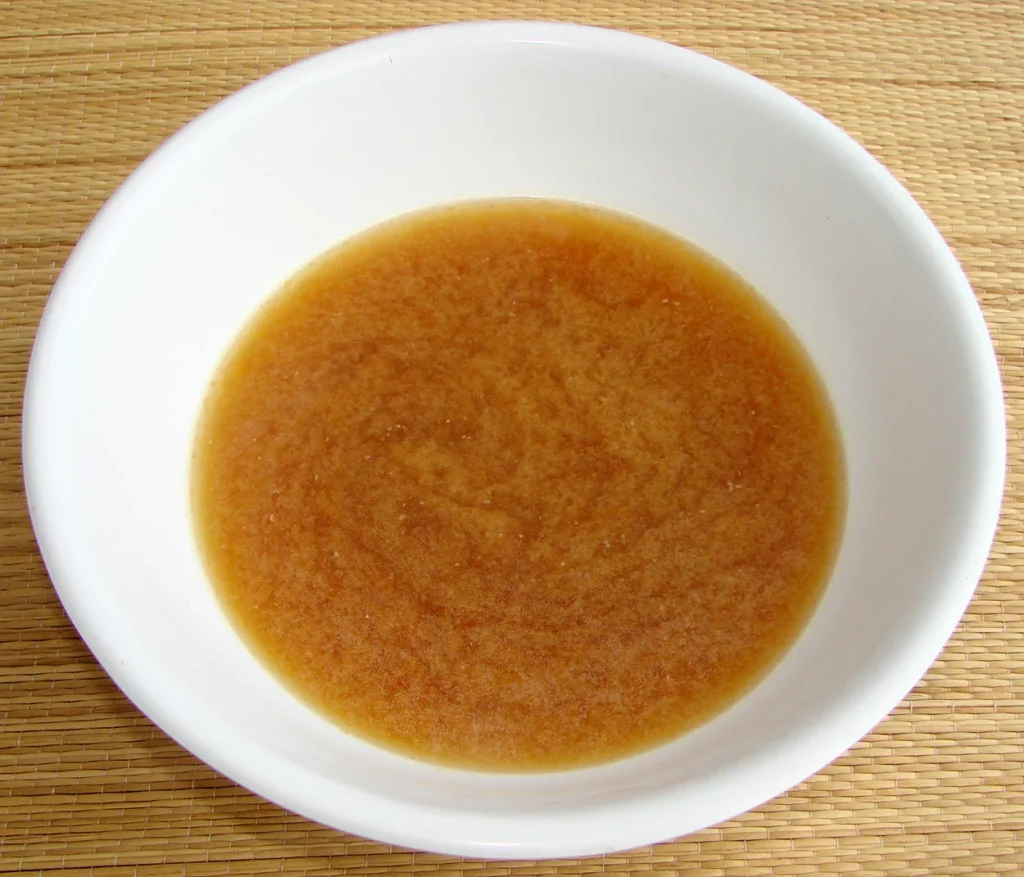
Allow the broth to cool to room temperature, then cover it and chill it.
Use your chicken bone broth within a week or freeze it for up to three months for later use.
Chicken Bone Broth Recipe
Bone broth, including the popular chicken bone broth, is considered one of the most nutritious foods you can consume. A key factor in its health benefits is the long cooking time, typically at least 24 hours. This extended cooking period allows the broth to absorb all the beneficial nutrients from the bones, resulting in a highly nutritious and flavorful liquid.
INGREDIENTS
- 4 pounds chicken necks/feet/wings (you can also use the carcass and bones from a whole chicken — do not use the meat)
- 3 carrots, chopped
- 3 celery stalks, chopped
- 2 medium onions, peel on, sliced in half lengthwise and quartered
- 4 garlic cloves, peel on and smashed
- 1 teaspoon Himalayan salt
- 1 teaspoon whole peppercorns
- 3 tablespoons apple cider vinegar
- 2 bay leaves
- 3 sprigs fresh thyme
- 5–6 sprigs parsley
- 1 teaspoon oregano
- 18–20 cups cold water
INSTRUCTIONS
- Place all ingredients in a 10-quart capacity slow cooker or large pot on stove.
- Add in water to cover.
- Simmer for 24–48 hours, skimming fat occasionally.
- Remove from heat and allow to cool slightly. Discard solids and strain remainder in a bowl through a colander. Let stock cool to room temperature, cover and chill.
- Use within a week or freeze up to three months.
NUTRITION
- Serving Size: 1 cup (253g)
- Calories: 41 calories
- Sugar: 0.3g
- Sodium: 286mg
- Fat: 0.3g
- Saturated Fat: 0g
- Unsaturated Fat: 0.3g
- Trans Fat: 0g
- Carbohydrates: 0.6g
- Fiber: 0.3g
- Protein: 0.5g
- Cholesterol: 2.5mg
RELATED ARTICLES



